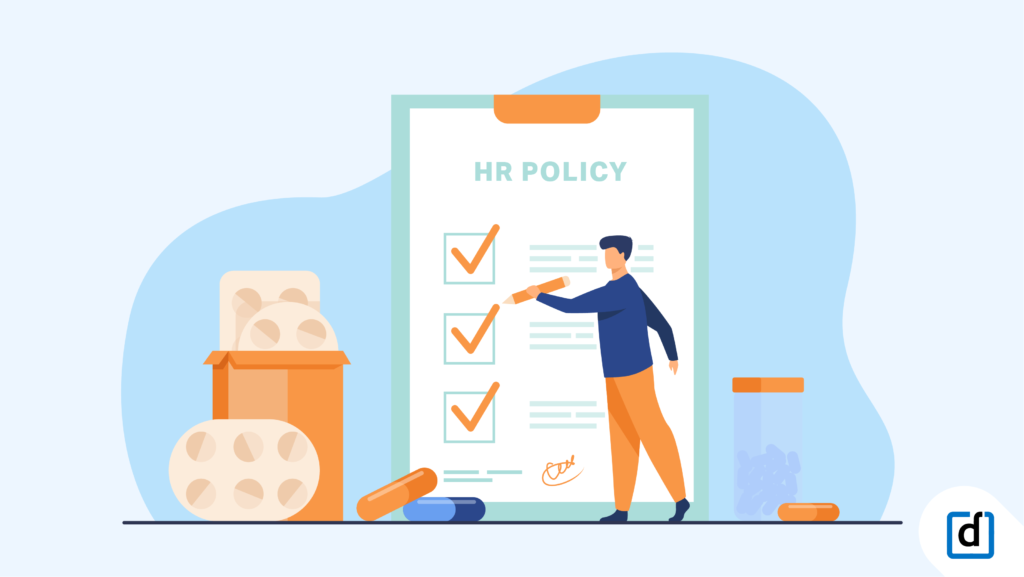What are HR policies?
HR policies are a set of rules for hiring, promotion, work process, leave, termination, work
environments, compensation, performance appraisal, and many other vital functions. HR policies are
also a layout of how an organization will treat its people and property. HR policies are important for
creating a clear and structured work environment for both employees and employers.
Some of the common HR policies that companies have are:
- Employee punctuality and attendance policy: This policy outlines the expectations and
procedures for being on time and ready to work for scheduled shifts. - Health and safety policy: This policy ensures that the workplace is safe and free from hazards,
and that employees follow the safety regulations and guidelines. - Pay and timekeeping policy: This policy explains how employees are paid, how their hours are
recorded, and how overtime and deductions are handled. - Leave policy: This policy specifies the types and amounts of leave that employees are entitled to,
such as sick leave, annual leave, maternity leave, etc. - Sexual harassment in the workplace policy: This policy defines what constitutes sexual
harassment, how to report it, and how it will be investigated and resolved - Code of conduct: This policy sets the standards of behavior and ethics that employees are
expected to follow in the workplace. - Employee wages: This policy outlines the minimum wage rates, salary scales, increments,
bonuses, and other forms of compensation that employees receive. - Termination of employment policy: This policy describes the reasons and procedures for
terminating an employee’s contract, such as resignation, retirement, dismissal, etc. - Work from home policy: This policy defines the eligibility and conditions for working remotely,
such as equipment, communication, productivity, etc. - Nondiscrimination policy: This policy prohibits any form of discrimination based on race, gender,
age, religion, disability, or any other protected characteristic.
These are some examples of HR policies that companies may have. There may be more or less
depending on the size and nature of the organization. HR policies should be updated regularly to reflect
the changing needs and laws of the workplace.
Why is it important to have proper HR policies:
Framing proper HR policies is important for any organization because they provide guidelines for
managing its people and ensuring a positive and productive work environment. Some of the reasons
why HR policies are important are:
- Showing respect for the needs of employees
- Providing guidance for conflict resolution and how to solve problems
- Providing guidance for training and development opportunities
- Creating clear guidance for fair compensation
- Outlining benefits and additional compensation requirements
Some of the essential HR policies that every company should have are:
- Employee punctuality and attendance policy
- Health and safety policy
- Equal employment opportunity policy
- Code of conduct policy
- Anti-harassment and anti-discrimination policy
- Leave policy
- Performance appraisal policy
- Grievance policy
- Termination policy
- Employee recognition policy
HR policies are important because they help the organization and its employees to work
effectively and efficiently.
These policies help the organization to communicate its mission, values and goals, align its
policies with legal requirements, foster a healthy work culture, and establish accountability and
transparency in decision-making.
HR policies manage employees by providing a clear and consistent framework for how they are
expected to behave and perform in the workplace. HR policies also outline the organization’s
obligations and responsibilities towards its employees, such as providing fair compensation, safe
work environment, training and development opportunities, and grievance resolution.
HR policies can help manage employees by:
- Setting and communicating the standards of conduct and ethics that employees should follow.
- Providing guidance for managers and supervisors on how to handle employee issues, such as
performance appraisal, feedback, discipline, and termination. - Aligning the organization’s policies with legal requirements and best practices to avoid lawsuits and
compliance issues. - Fostering a positive and productive work culture that supports the organization’s mission, values, and
goals. - Enhancing employee engagement, satisfaction, and retention by showing respect for their needs and
offering benefits and incentives.
HR policies are an essential part of human resource management and should be developed and
implemented with care and consultation with the relevant stakeholders. HR policies should also
be reviewed and updated regularly to reflect the changing needs and laws of the workplace.
Next Innovation Asia


